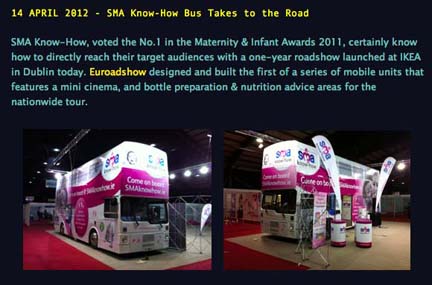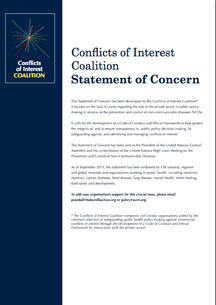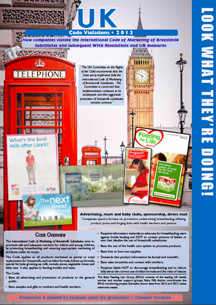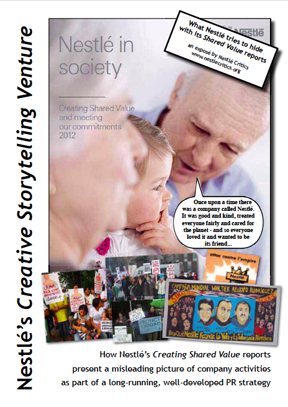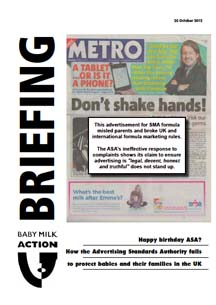Update 45
Featured items in the Virtual Shop
Click on the images to view them in the Virtual Shop, where you can make purchases via our secure server.
IBFAN Breastfeeding Calendar - now reduced
Complementary Feeding: Nutrition, Culture and Politics
by Gabrielle Palmer, author of The Politics of Breastfeeding (and one of the experts appearing in the Infant Formula Explained DVD).
This thought-provoking book provides an important perspective to the debate about the role of fortifed processed foods.
Secret Manoevres in the Dark by Eveline Lubbers.
This disturbing book is about undercover operations by companies - it has a chapter on Nestlé.
Infant Formula Explained DVD and iPhone app
The DVD has a 25-minute film for health workers, where experts explain about formula and answer typical questions from parents and carers, a 7-minute film for use with parents and carers who have decided to formula feed (and health workers with less time available) and a 10-minute film showing how to make up powdered formula in line with WHO guidance.
The last two films are included in the IFE iPhone app.
MyMeter iPhone app
Thanks to Nigel Harrison for developing the. The dial and tone indicate when you are getting closer to the item/person you are detecting. Set it to display “Nestlé Product!” and see what happens when the alarm goes off. Give your target an updated Nestlé boycott product list cards as compensation.
Nestlé Monster T Shirts
Thanks to Rebecca Clark for this image, also available on a reusable shopping bag.
Membership of Baby Milk Action
Essential reading
Free downloads of these papers can be accessed by clicking on the thumbnails.
In some cases this will take you to another page where you will be able to download the latest version of the document and also purchase a printed version, if this is available.

Policy news
No claims at Codex
We joined the IBFAN team, representing IACFO (the International Association of Consumer Food Organisations) at the Codex Alimentarius Nutrition meeting in Germany in December. GAIN and the baby food industry failed in an attempt to legitimise health claims in the Guidelines on Formulated Supplementary Foods for older infants and young children. At the request of the IBFAN delegate the FAO/EU film (see below) was shown to everyone. It was also shown at the Save the Children workshop on Infant and Young Child Feeding in Emergencies in June. There was much debate about when supplements are needed and how they might undermine local family foods.
Improve the food security of farming families affected by volatile food prices. This short but important film by the Food and Agriculture Organisation (FAO) and the EU gives a different message to those suggesting that all babies need micronutrient supplements. The film shows children in Cambodia getting healthier as parents learn how to provide nutritious meals from readily available local ingredients alone.
The IBFAN group in Indonesia, AIMi, made another useful film(cartoon with english subtitles), with the support of Save the Children. AIMi also managed to stop an unethical industry funded formula trial going ahead in January (see below).
Whether the Codex Follow-on Formula Standard should be revised was also a hot topic, with the baby food industry keen to open up the market - not just for formulas for 6-12months, but for the potentially huge market for older babies and young children. WHO, supported by many governments, including the US, called for a review on whether there was any need for these products or indeed a separate standard.
The EU has been discussing much the same questions during the reform of PARNUTS, the Framework Directive that determines how baby formula and food legislation is formed. MEPs called for much stricter rules on marketing and the use of the precautionary principle. The Greens called for no advertising of foods for infants and young children. MEPs, like most health professionals are worried about formulas for older babies and young children, not just because of the cross-branding but the excess sugar levels. The European Food Safety Authority (EFSA), which has revised its rules on Conflicts of Interest, will review these products and the nutritional needs of infants and young children. Among other changes, baby pictures and idealised images and text on follow-on formula labels will end and promotion of specialised formulas will be reviewed and possibly curtailed. See Policy Blog: http://info.babymilkaction.org/EUFOODLAW
WHO Reform, Non-communicable Diseases, Conflicts of Interest and WHO’s interactions with "Non State Actors"
These have been key cross-cutting issues that we have followed at WHO’s meetings and consultations throughout the year as members of IBFAN, the Conflict of Interest Coalition and Democratising Global Health.
WHO’s Director General, Dr Margaret Chan, is now repeatedly stressing the need to protect WHO’s ‘norms and standards’ setting process. A WHA Resolution (65.6) passed in May 2012 called for safeguards against conflict of interest in policy development and implementation of nutrition programmes. Whether WHO will adopt a coherent and effective policy to protect itself and its policy making process from undue influence remains to be seen. Resolution 65.6 also addressed breastfeeding and the marketing of complementary foods. (See stories on PAHO page 21 and GAIN page 25.)
GAIN’s Trojan Horse fails
STOP PRESS - After UPDATE went to Press GAIN told us that Danone is no longer a member because it is a Code violator.
The Global Alliance for Improved Nutrition is an especially worriesome entity.
On the Lead Group of SUN (the Scaling Up Nutrition Initiative - see page 24) it is in a key position to influence SUN policy development. GAIN often presents a benign image as a non-profit NGO that is only interested in reducing malnutrition through local foods and small companies. However, those of us who are involved in advocating stricter marketing controls see a different side.
For example:
• Lobbying at Codex
For the last 3 years we have witnessed GAIN’s lobby against World Health Assembly Resolutions atCodex Alimentarius meetings where global food standards are set.
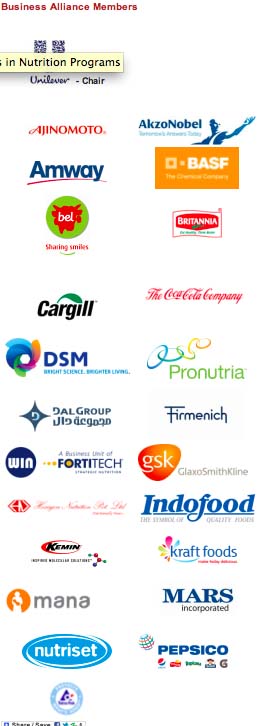
GAIN is clearly trying to open up markets for fortified foods and supplements for its Business Alliance members such as Danone (see note above), Pepsico, Coca Cola, Brittania. Some of the members are pictured left. (See page 26.)
• Lobbying Kenya
In October, GAIN challenged the Kenya’s draft law that proposed strict controls on baby formulas and foods. In its lobby paper GAIN implied that proceeding with the law would threaten "Kenya’s ability to meet its commitments as a Scaling Up Nutrition (SUN) country." We have asked how SUN can claim to be government-led when a member of its Lead Group is doing such lobbying. Kenya went ahead with the Law. (See page 15.)
• World Health Assembly
GAIN has been involved in WHO’s work on micronutrients and in 2012 applied for official NGO relations status. This would allow it to make interventions at Assembly meetings. The WHO Executive Board in January 2013 did not approve the application, pending answers to questions about GAIN’s relations with global corporations and allegations about its lobbying against WHA Resolutions on baby foods.
(See Executive Board Resolution 132.R9. January 2013)
• Monitoring
The first report of the GAIN sponsored Access to Nutrition Index (ATNI) was published in March 2013. The report scored 25 of the world’s largest food and beverage manufacturers on the basis of their written policies and statements, rather than on independent monitoring of their actions on the ground.
The highest scores went to the companies that have invested most in using Public Relations strategies to counter criticisms. Danone, Unilever, Nestle, PepsiCo and Kraft reaped the reward as media reports described them as the "best large firms worldwide when it comes to offering products that address both the problems of obesity and poor nutrition…" (USA Today).
ATNI criteria are the perfect whitewash because they reward companies for all the wrong things: the promotion of fortified foods, consumer ‘education’ about healthy diets and active lifestyle, and engagement with ‘stakeholders’ in public private partnerships.
• Lack of transparency
The British Medical Journal wrote to Veena Rao about her opinion piece entitled, "Law on infant foods inhibits the marketing of complementary foods for infants, furthering undernutrition in India"
In this online Personal View ..Veena Rao, did not declare any competing interests. She has now told us that she has been "a member of the Advisory Board on the Britannia Nutrition Foundation (a non-profit trust) since 2009."
Brittania Industries is represented on the Lead Group of SUN and the Board of GAIN. Its stated purpose is to "Help people enjoy life –through healthy snacking." Encouraging all day snacking on ‘slightly better for you’ junk foods seems to be one of the food industry’s Top Strategic Priorities.
IBFAN Concerns about Public Private Partnerships
Update readers will know that Baby Milk Action and our partners in the International Baby Food Action Network (IBFAN) have been worried for some time about the rise of Public Private Partnerships (PPPs) and alliances such as the Global Alliance for Improved Nutrition and the Scaling Up Nutrition Initiative called SUN. SUN emerged from a World Bank initiative in 2009 and calls itself a global ‘movement’ that unites governments, civil society and businesses in an effort to end undernutrition.
While IBFAN supports SUN’s call for multi-sectoral action on nutrition and support and protection for breastfeeding, we have many concerns about one of SUN’s aims,which is that governments set up multi-stakeholder ‘platforms at country level. A Sun Business Network was set up in December to increase business involvement on these platforms.
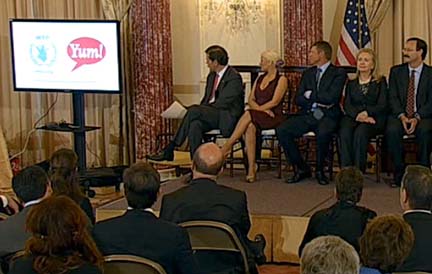
US Secretary of State, Hilary Clinton, and the singer Christina Aguliera watching a presentation of the World Food Programme in partnership with the ‘YUM’ (KFC, Pizza Hut, Taco Bell) brand.
We have long experience on the EU Platform on Diet and Physical Activity and know the risks well.
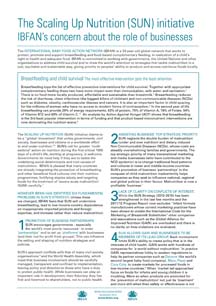 In November, after much consultation, including with SUN members and leadership, we published a Discussion Paper outlining our concerns and SUN’s lack of adequate safeguards on conflicts of interest, without which conflicted corporations can gain unprecedented opportunities to influence health policies. We believe the SUN approach conflicts with World Health Assembly Resolutions. WHA Res.65.6 specifically calls for safeguards against conflict of interest in policy development and implementation of nutrition programs. Surely businesses should only be involved once policies are decided?
In November, after much consultation, including with SUN members and leadership, we published a Discussion Paper outlining our concerns and SUN’s lack of adequate safeguards on conflicts of interest, without which conflicted corporations can gain unprecedented opportunities to influence health policies. We believe the SUN approach conflicts with World Health Assembly Resolutions. WHA Res.65.6 specifically calls for safeguards against conflict of interest in policy development and implementation of nutrition programs. Surely businesses should only be involved once policies are decided?
In response to these concerns SUN leaders are now stressing breastfeeding and the need for initiatives to be 'government-led' more. We hope this will signal the need for proceeding with caution rather than confidence. For sure, if children are to be protected they need more than words and they need SUN to pay attention to what GAIN and others do at Codex and at government level. (See page 25.)
Malang Fofana, the head of the Gambian delegation to the Codex Nutrition meeting, 2011, gave the following warning:
"Because of the move to ‘product-based’ solutions, funding is already drying up for most infant and young child feeding support programs and for community-based approaches that teach and promote skills to make nutritious family foods from local indigenous ingredients. I fear that once this runaway train leaves the station there will be no stopping it."
The Special Rapporteur on the Right to Food, Olivier de Schutter, calls on SUN and other initiatives to "begin by regulating the marketing of commercial infant formula and other breastmilk substitutes and not to“overlook the entitlements that have been established under international law for women, children, minorities, refugees and internally displaced persons."
See: http://www2.ohchr.org/english/bodies/hrcouncil/docs/19session/A.HRC.19.59_English.pdf
• The Global Social Observatory will do a Consultation Process on Conflict of Interest in the SUN Movement, to be funded by the Gates Foundation, which is also a funder of SUN. Let’s see...
Research news
Effect of provision of daily zinc and iron with several micronutrients on growth and morbidity among young children in Pakistan: a cluster-randomised trial.
This Gates-funded trial in Pakistan shows that Infants and young children given micronutrient powders (containing iron; folic acid; and vitamins A, C, and D, with or without additional zinc) had more bloody diarrhoea and more respiratory symptoms than controls. The authors have called for a closer look at safety before distribution is scaled up. "Use of micronutrient powders reduces iron-deficiency anaemia in young children. However, the excess burden of diarrhoea and respiratory morbidities associated with micronutrient powder use and the very small effect on growth recorded suggest that a careful assessment of risks and benefits must be done in populations with malnourished children and high diarrhoea burdens."
Soofi, Bhutta et al The Lancet - 18 April 2013: 10.1016/S0140-6736(13)60437-7
WHO Guideline:Use of multiple micronutrient powders for home fortification of foods consumed by infants and children 6–23 months of age does recommend the use of these powders - but with provisos: "Programmes involving the use of multiple micronutrient powders for home fortification of foods should be preceded by an evaluation of the nutritional status among children under 5 years of age ...to ensure that the daily micronutrient needs are met and not exceeded."
http://whqlibdoc.who.int/publications/2011/9789241502047_eng.pdf
Profits and pandemics: prevention of harmful effects of tobacco, alcohol, and ultra-processed food and drink industries.
This study assesses the effectiveness of self-regulation, Public Private Partnerships (PPPs), and public regulation and concludes that unhealthy commodity industries should have no role in the formation of Non-Communicable Disease (NCD) policy. On our request this was discussed at the European Platform Plenary meeting in February. Discussing the merits of product reformulation "in low-income countries, benefits are less obvious, and the dangers are very apparent. In such countries, consumption of ultra-processed products is low. These countries are therefore the prime targets of transnational corporations." An increase in the overall consumption of ultra-processed products would "undermine long-established dietary patterns based on fresh or minimally processed foods."
The Lancet, Volume 381, Issue 9867, Pages 670 - 679, 23 February 2013 http://www.thelancet.com/journals/lancet/article/PIIS0140-6736%2812%2962089-3/abstract
Call to end early cord cutting
UK Medical bodies, senior doctors and the National Childbirth Trust (NCT) are calling for an end to clamping of a baby’s umbilical cord as soon as it is born. Newborn babies deprived of vital blood from the placenta are more at risk of iron deficiency - all the better for the companies selling fortified formulas and supplements!
http://www.guardian.co.uk/society/2013/apr/25/cutting-cord-babies-risk-nhs?INTCMP=SRCH http://www.who.int/elena/titles/cord_clamping/en/
Inconvenient truth?
Everyone agrees that malnutrition is a shameful world problem that must be tackled. However, the idea that the answer is giving micronutrient supplements to all children, regardless of whether they are needed, is risky. Marketing them freely to all even more so. The study from Pakistan below shows some of the problems and urges caution. Like all studies this needs to be evaluated and corroborated - but such evidence should not be overlooked just because it’s "inconvenient." The film from Cambodia* shows the importance of nutritious foods from local ingredients.
A bit of history on ‘Sprinkles’
Dr. Stanley Zlotkin did the research to develop a micronutrient powder called ‘Sprinkles’ in 1996 and owns its patent. He went on to commercialise them globally in conjunction with the H.J. Heinz Company and Foundation in 2001. He has been an infant feeding consultant for Nestlé and Mead Johnson and in Canada has pushed iron supplementation for all breastfed babies.
* "Improve the food security of farming families affected by volatile food prices" by the Food and Agriculture Organisation (FAO) and the EU. See page 26.
Nestlé boycott
Taming the Nestlé monster at the last Croydon demo
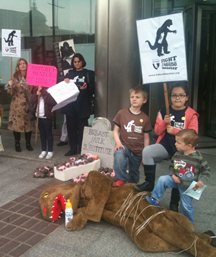 Campaigners gathered for the annual boycott demonstration at Nestlé (UK) HQ in Croydon, prior to the company’s relocation to Gatwick and faced the Nestlé monster - a costume dinosaur representing the company, which tramples on the rights of mothers and babies - unless we take action to stop it. Look out for the film clip online.
Campaigners gathered for the annual boycott demonstration at Nestlé (UK) HQ in Croydon, prior to the company’s relocation to Gatwick and faced the Nestlé monster - a costume dinosaur representing the company, which tramples on the rights of mothers and babies - unless we take action to stop it. Look out for the film clip online.
Campaigners distributed "Fight the Nestlé monster" leaflets with ten facts executives do not want people to know. The leaflet included an QR code for smartphones to access further details. Click here to download the leaflet.
Nestle tries to undermine International Nestle-Free Week with KitKat pledge
In an attempt to divert attention from International Nestlé-Free Week (29 October - 4 November 2012), Nestlé announced that its two-finger KitKat chocolate bars will bear the Fairtrade logo - from January 2013. International Nestlé-Free Week is a time for people who boycott Nestlé over the way it pushes baby milk to do more to promote the boycott - and for those who don’t boycott to give it a go.
According to statements from Nestlé and the Fairtrade Foundation a total of 7,000 farmers will provide cocoa for KitKat under Fairtrade terms, up from the 6,000 announced in 2009 when only the four-finger KitKat had the Fairtrade mark (though, curiously, the latest statements claim the initial number of farmers was 2,500).
The 9,600 tonnes of cocoa Nestlé says it will buy through the Fairtrade scheme amounts to 2.6% of its annual cocoa purchase (about 364,000 tonnes). It has been criticised for failing to deliver on its 2001 commitment to end child slavery and child labour in the supply chain as a whole within five years. Baby Milk Action has produced a leaflet explaining "Why boycott Nestlé Fairtrade KitKat" with key facts on the baby milk issue, as well as concerns about Nestlé’s sourcing of cocoa and other business practices - click here for this and other leaflets.
Rachel’s Dairy added to Nestlé boycott list
Rachel’s Dairy has been added to the Nestlé boycott list for the UK as it is now owned by Lactalis Nestlé Chilled Dairy (LNCD). Lactalis purchased Rachel’s Dairy in August 2010. In May 2012 the organic yoghurt and dairy product company was moved into LNCD, which is a joint venture with Nestlé. Lactalis owns 60% of LNCD and Nestlé 40%.
US Girl Scouts shamed by association with Nestle
The US Girl Scouts put its name to a Nestlé candy bar marketing campaign that ran in August 2012 to boost sales in September. Campaigners called on Girl Scouts to ditch Nestlé and send a message of solidarity to women in the Philippines instead. (See page 16).
Nestlé was also criticised for breaking a commitment in the US not to target children with junk food advertising, but claimed that although the adverts featured a Girl Scout they were aimed at adults.
Eye on Nestle - part 2
Nestlé weakens its formula marketing policy
Nestlé’s policy and instructions fail to respect the Code and subsequent, relevant Resolutions of the World Health Assembly.
Although monitoring evidence shows that Nestlé breaks its own weaker instructions, previously these claimed that Nestlé would not promote (in countries of its own choosing): "a) all infant formula and b) all follow-up formula products except in the rare instances where they have brand/label design which is distinctly different from infant formula."
In the version of the Instructions introduced in July 2010, Nestlé has weakened this by limiting the scope of its instructions to products up to 1 year of age: "They also apply to follow-up formula products which are marketed for consumption by infants up to 1 year of age."
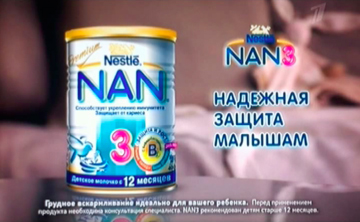 This came to light as Nestlé is increasingly promoting its formula brand names through milks for older babies, as in this example reported in Armenia. This is one of Nestlé "high risk" countries and so would not have been permitted under its old Instructions.
This came to light as Nestlé is increasingly promoting its formula brand names through milks for older babies, as in this example reported in Armenia. This is one of Nestlé "high risk" countries and so would not have been permitted under its old Instructions.
Change prompted by FTSE4Good?
Nestlé made the change shortly before FTSE introduced weakened criteria for its FTSE4Good ethical investment index in September 2010. Nestlé was added to the Index in March 2011 even while violating the World Health Assembly marketing requirements. FTSE assesses companies against their own policies rather than the International Code and Resolutions.
WHO speaks out against PAHO - Nestlé link
A Reuters Report (19 October 2012) revealed that the Pan American Health Organisation (PAHO) had accepted funding from various companies, including Coca Cola and Nestlé, prompting WHO to issue a clarifying statement:
"The World Health Organization (WHO) recognizes the importance of working with the private sector. However since part of our work involves setting norms, standards and guidelines for public health, we have very strict guidelines for accepting money from the private sector. WHO does not accept funds from the food and beverage industry for its noncommunicable diseases work. It is unfortunate that the Pan American Health Organization (PAHO-WHO) has accepted money from the food and beverage industry. PAHO - while it is a WHO regional office for the Americas – is, unlike the other regional offices, also the health agency of the Organization of American States. Therefore in some areas, PAHO has its own operating guidelines. Not all PAHO guidelines are aligned with WHO. One such area is collaboration with the private sector."
 Campaigners in the region launched a petition on the Care2 site and the logo shown left - http://bit.ly/QWyp1k
Campaigners in the region launched a petition on the Care2 site and the logo shown left - http://bit.ly/QWyp1k
Seven distinguished nutrition scientists, members of the World Public Health Nutrition Association, sent an open letter to Carissa Etienne, PAHOs new director calling for No more deals with Nestlé please.
http://www.wphna.org/2013_mar_hp1_paho.htm
Eye on Nestle - part 1
Nestlé loses spying case and is ordered to pay damages to victims
 A Swiss court has ordered Nestlé and Securitas to pay damages and legal costs to members of ATTAC Switzerland for violating their privacy. Nestlé contracted Securitas to recruit spies who infiltrated the group when it was producing a book on Nestlé’s harmful business practices in 2003 (Baby Milk Action spoke at the launch in Nestlé’s home town of Vevey, Switzerland in June 2004, Update 35).
A Swiss court has ordered Nestlé and Securitas to pay damages and legal costs to members of ATTAC Switzerland for violating their privacy. Nestlé contracted Securitas to recruit spies who infiltrated the group when it was producing a book on Nestlé’s harmful business practices in 2003 (Baby Milk Action spoke at the launch in Nestlé’s home town of Vevey, Switzerland in June 2004, Update 35).
In typical media management style, Nestlé responded publicly to the court ruling saying it would study the Judge’s ruling and, "If it should turn out that a Nestlé employee had acted negligently, we shall take appropriate measures." Fortunately Le Courier newspaper was not so naive as to fall for the "over-enthusiastic rogue employee breaking the rules" spin, commenting (26 January 2013):
One may recall that the [Nestlé] defense attorneys had worked diligently to present the ATTAC members as potential criminals in order to better justify "the preventive observation" of their activities. They had also declared that owing to their militant commitment, they could not "claim such an extended protection of the private sphere" as an ordinary citizen.
In other words, Nestlé’s defense was campaigners are fair game to be spied on.
The operation reported to Nestlé’s head of security - a former employee of the British Secret Service MI6 (made famous by the James Bond stories). Nestlé and Securitas claim the operation ended in 2005. Yet ATTAC Switzerland claim they detected another Securitas employee attending meetings as late as 2008 and are going to pursue the case. (See the book, Secret Manoevres in the Dark.)
Nestlé completes takeover of Pfizer Nutrition/Wyeth
Nestlé announced it was purchasing Pfizer’s nutrition business in April 2012, having won a fierce battle with Danone, the world’s second largest baby milk company.
It paid US$11.9 billion for the company and had obtained regulatory approval in 85% of markets at the time it announced the deal was complete on 1 December. Mexico blocked the takeover, fearing price hikes, and anti-trust authorities in South Africa, Kenya and five Latin American countries had not yet approved the deal, according to Dairyreporter.com (3 December).
Pfizer Nutrition was formerly known as Wyeth in some countries and markets formula brands S-26, SMA and Promil. The purchase brings Nestlé into the UK market, where it previously had only specialist formulas after trying unsuccessfully to enter the general infant nutrition market three times in recent years (see past Updates).
However, Nestlé says its interest in the business is because "85% of its sales are in emerging markets". It is in countries where breastfeeding rates are currently high, but formula marketing regulatiions are not yet in place where the industry sees maximum potential for growth.
Nestlé centre monitors digital communications
Reuters reported in October 2012 that Nestlé has been running a Digital Acceleration Team for the past year from its Vevey Headquarters:
"It looks like mission control: in a Swiss market town, an array of screens in Nestle’s headquarters tracks online sentiment. Executives watch intently as California wakes up, smells the coffee - and says whether it likes it."
"If there is a negative issue emerging, it turns red," says Blackshaw [who manages the centre], indicating a screen powered by software from Salesforce.com Inc., which is also used by such brands as Dell computers and delivery company UPS. It captures millions of posts each day on topics of interest to Nestle."
Insight - At Nestle, interacting with the online enemy: Reuters 26 October 2012.
Irish Midwife of the Year refuses to be branded with SMA
Baby Milk Action was pleased to support a campaign in Ireland in November against baby food companies sponsoring awards to health workers organised by Maternity and Infant magazine. The main sponsor of the event for the past five years is Pfizer/Wyeth, which uses the awards to promote its SMA brand of formula.
Last year Pfizer/Wyeth received a Maternity and Infant Award itself for SMA, which it then used in its advertising without mentioning it sponsored the awards. The Irish Advertising Standards Authority upheld a complaint from rival Danone. In 2012 Danone, manufacturer of Aptamil and Cow & Gate products, was allowed to be a sponsor to promote its own formula brands.
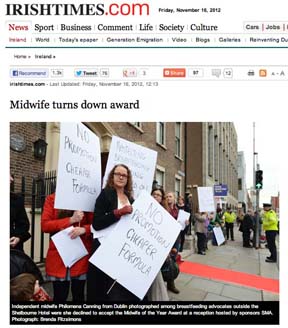
Philomena Canning from Dublin, refused her award when she learned that it would brand her the SMA Midwife of the Year and instead organised a demonstration (left).
In December a letter signed by over 100 members of The Nurses and Midwives Board of Ireland called on the Board to remind members that the Code of Professional Conduct states, “The nurse should avoid the use of professional qualifications in the promotion of commercial products...” CEO Maura Pidgeon replied announcing a review of the Code was underway, including a consultation of professionals and the public.
The SMA Baby Know How roadshow began in Ireland in April 2012, before the attempt to launch it in the UK (see page 19).
The website yourroadshow.com explains how the specially adapted bus contains a mini cinema and bottle preparation and nutrition advice areas and more units are planned.
